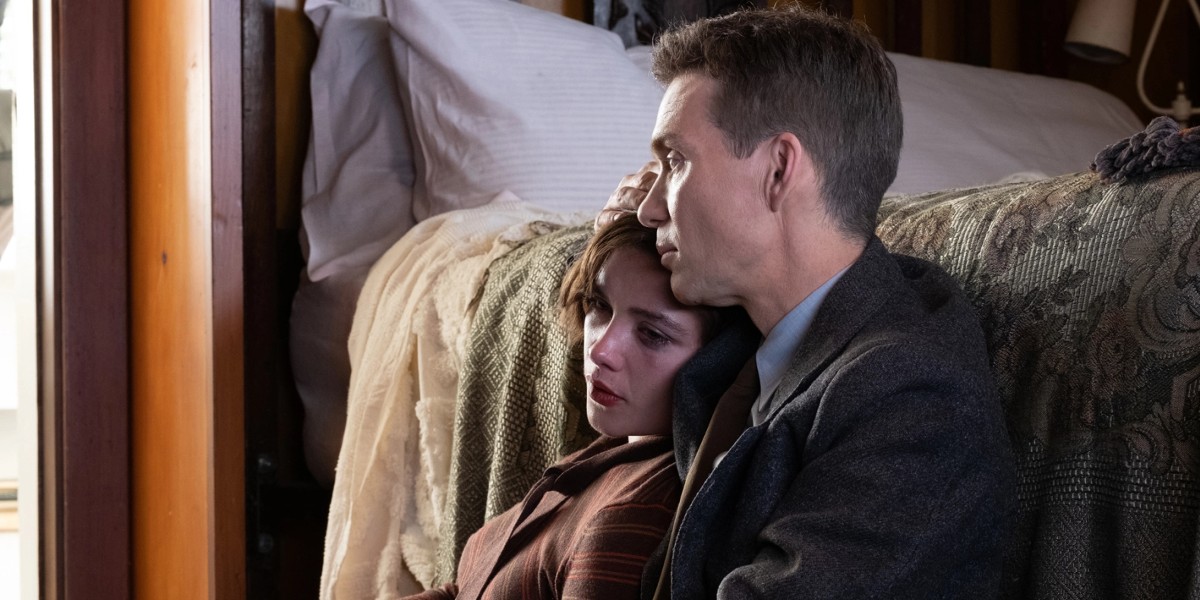The Outrage Over Sex Scenes Has Gotten Out of Hand

Sex scenes have been a part of television and movies for my entire life. So that’s at least a couple of decades of sexually explicit material in your entertainment. I’m not even that old. And there are plenty of movies and television shows that had sex scenes prior to me joining the world. My point here is that there have been sex scenes in media for quite some time. I know I’m not alone in this experience, but I used to watch HBO shows with my mom and she’d simply say, “close your eyes” when a sex scene happened. (After I went through sex ed in school and she tried to tell me to close my eyes during a sex scene, I said, “mom I know what’s happening,” and she said “okay” and let me watch my shows in peace.)
So maybe it’s because I have just always watched things with sex scenes in them, or maybe I am just built differently than the latest group of people talking about this, but this aversion to sex scenes that’s popping up on social media is really weird. In recent years, a new idea has emerged—that sex scenes “don’t help develop anything” in terms of plot, which is not true. Famously, all of Javier Peña’s sex scenes in Narcos give insight into where his character is emotionally.
The latest “outrage” has to do with Oppenheimer, as audiences go on social media to complain about Florence Pugh and Cillian Murphy’s sex scenes. The film features two sex scenes that many have called “unnecessary,” or suggested that taking them out of the movie wouldn’t hurt it (which is not true). This new need to censor movies because of your own ideals or discomfort is putting your own thoughts and feelings above everyone else’s and that’s a problem we need to unpack. Made so much worse by social media.
It’s not everyone else’s problem!
There are people on TikTok, like user ThatsNotLove, pushing the narrative that if someone watches “corn” (the code word for porn on TikTok) in a relationship then that is considered cheating. These are some of the same people pushing the narrative that the sex scenes in Oppenheimer are not crucial to the story. Moreover, these individuals who don’t want to see sex scenes (whether it’s because they consider them to be pornographic or because of their own personal reasons) should quite frankly be making these choices for themselves only.
Going on social media to talk about sex scenes in a negative way, dismissing their importance in film and television, or pushing the narrative that things of a sexual nature in media are unnecessary because you don’t want to see it is censorship, plain and simple. It also plays into a bigger social and cultural issue.
Right now, the topic of conversation is Oppenheimer, but the idea that sexuality or sex of any kind in media is bad comes from a conservative talking point. Even the most wholesome queer media, like Heartstopper, is being censored because conservatives think it’s being used “to recruit your kids.”
While the Heartstopper news is a different beast, the sex scene discourse is a symptom of the same disease. That disease being that everyone has to agree with you and be on your side about what is and isn’t necessary. Conservatives want to control what people see and what they believe so that others will fall in line with their ideology. That’s what this sex scene discourse has boiled down to, whether it was the original intention or not.
The issue with the current social media trend is that everyone who talks about avoiding sex scenes has consistently done so by dismissing their importance to the overall story or to character arcs. It’s particularly interesting because there has been a notable decline in sex scenes in movies and TV, and rom-coms and erotic thrillers have become more rare.
This is having an effect on movies and how we experience them
Whether or not the lack of erotic thrillers in our modern age is tied to this “sex scene” discourse, it is still a trend. Where are the Fatal Attractions or the What Lies Beneath-esque movies? Why are those now gone in the 21st century, but were thriving in the ’80s and ’90s? How was the 20th century somehow more open about sexuality and sex than the modern age?
What I was taught as a kid is simple: If you don’t have anything nice to say, don’t say anything at all. So if you are so bothered by seeing a sex scene in media and you really don’t want to watch it, that’s actually fine! What’s not fine is forcing everyone else to believe what you do and for art to be censored because of it. It’s now gotten to the point where if there’s a sex scene in a movie, I have to hear about it for weeks on end.
Really? If you think that a movie or a show “doesn’t need” a sex scene, then you are not paying attention to what that scene might actually have to say about its characters. If you’re that upset about a sex scene, maybe don’t watch movies! Help yourself by not putting yourself in that situation. Instead, you’re going to try and force your views on everyone else? Enough.
(featured image: Universal Pictures)
Have a tip we should know? [email protected]
